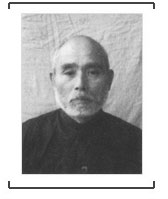Abstract of Kamisaka Katsu's confession
 0 Comment(s)
0 Comment(s) Print
Print E-mail China.org.cn, July 6, 2014
E-mail China.org.cn, July 6, 2014
|
|
Kamisaka Katsu
According to the written confession of Kamisaka Katsuin July 1954, he was born in 1892 in Oita Prefecture, Japan. He served as deputy battalion chief and battalion chief of the Infantry Regiment in Taiwan with the rank of major and lieutenant colonel respectively from March 1934 to November 1941. He became major general and commander of the 53rd Infantry Brigade of the 59th Division in June 1945. On 20 August 1945, he was captured by the Soviet Army near Hamhung, the Korean Peninsula.
Major offences:
"In February 1942 when I served as commander of the 163rd Infantry Regiment stationed in Baoding, Hebei", "I arrested or put into jail about 20 Chinese people" and "killed them through beheading, bayoneting, etc."; "around March", "for the reason that about 10 meters of rails were removed from the Beijing-Hankou railway between Wangdu Station and Qingfengdian Station", "more than 10 suspects were arrested and 3 or 4 of them were killed after interrogation and torture"; "around May, a Japanese blockhouse along the railway near Wangdu (about 1 kilometers west to Wangdu) was attacked and destroyed by the Eighth Route Army", "30 residents were interrogated and tortured, 6 conspirators were killed, and 3 civilian houses close to the blockhouse were burned down"; "around June", because another Japanese blockhouse in Wangdu was attacked and destroyed by the Eighth Route Army, "many residents were interrogated and tortured, 5 conspirator suspects were killed, and several civilian houses were burned down";
27 May 1942: during the battle in central Hebei, in a place 22 kilometers to the southeast of Dingxian County, Hebei, "I ordered the 1st Battalion to kill over 800 people, including soldiers of the Eighth Route Army and local inhabitants", and "poison gas in red and green canisters were used; not only soldiers of the Eighth Route Army, but also the local inhabitants who lost their way in the escape, were shot by machine guns. We carried out a mopping up operation in the village and threw poison gas contained in red and green canisters into the tunnel where many local inhabitants hid, suffocating many and killing through shooting, bayoneting and hacking those who could not stand the poison gas and ran out." "The result of the war" in central Hebei "was the following losses on the Chinese people: around 1,100 people were killed, 10 houses damaged, 3 houses burned down, 450 houses appropriated for 10 days, and 240 Chinese people were forced to build 8 blockhouses (for 10 days)";
Spring 1943: in the mountainous area in the northwest of Xingtang, Hebei, the 2nd Battalion "killed about 250 people, including soldiers of the Eighth Route Army and residents, and burned down about 50 houses", and "all troops (vanguard troops as mentioned before) organized residents into detection groups and ordered them to go in front of the troops to detect land mines, killing them in this way";
May 1944: because one Japanese soldier was missing in Songxian County, Henan, "more than ten residents were arrested, 5 or 6 of them were killed and 12 or 13 houses were burned down";
June 1945: During "the march from Xichuan to Xixia" in Henan, "we took (I think maybe 50) captives along with the troops. When we got to a place to the south of Doufudian, we felt it increasingly difficult to move forward with these captives, so I ordered that all troops 'must kill burdensome captives'", "and all captives were killed".
(Source: The State Archives Administration of China)







Go to Forum >>0 Comment(s)